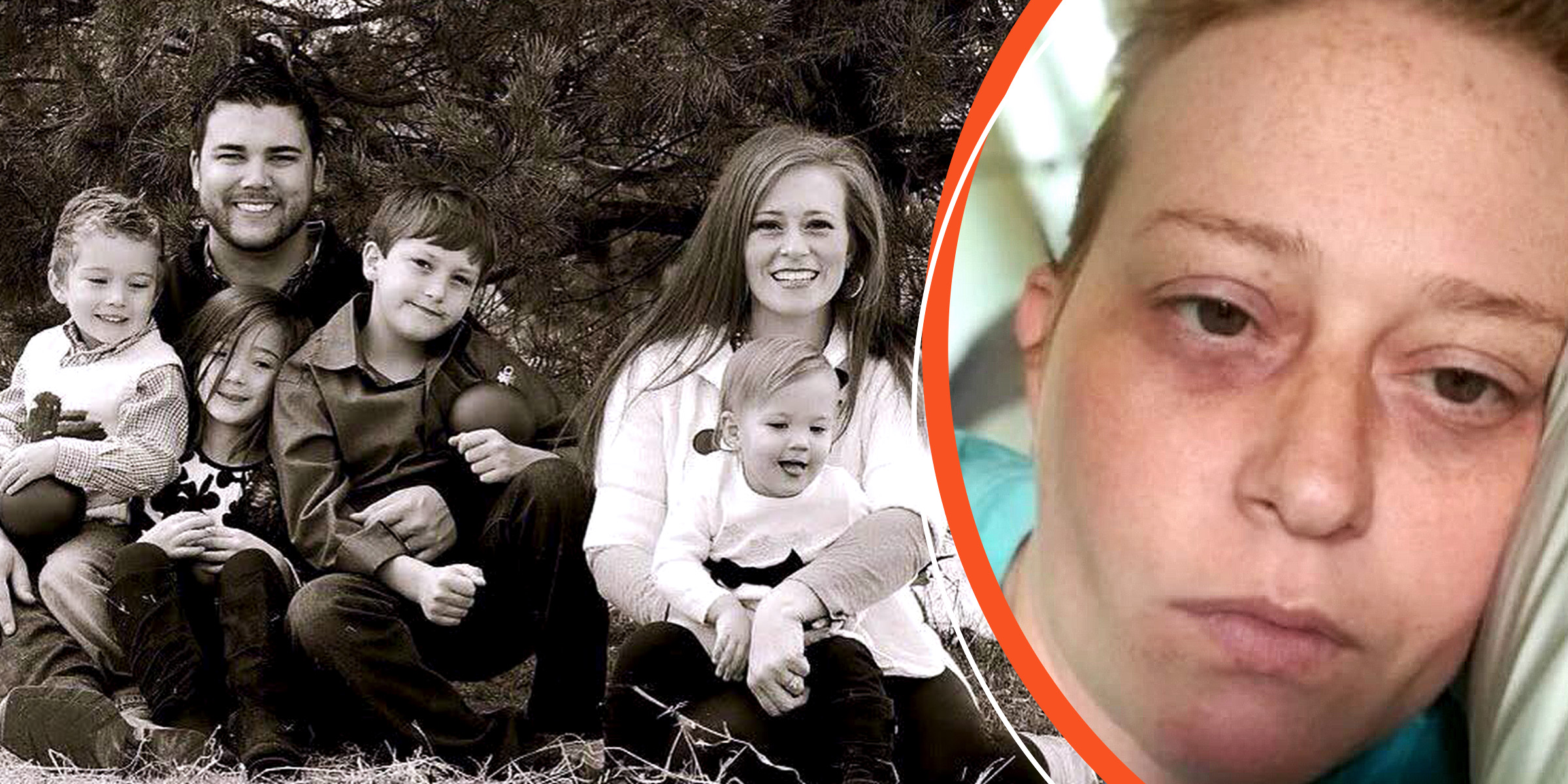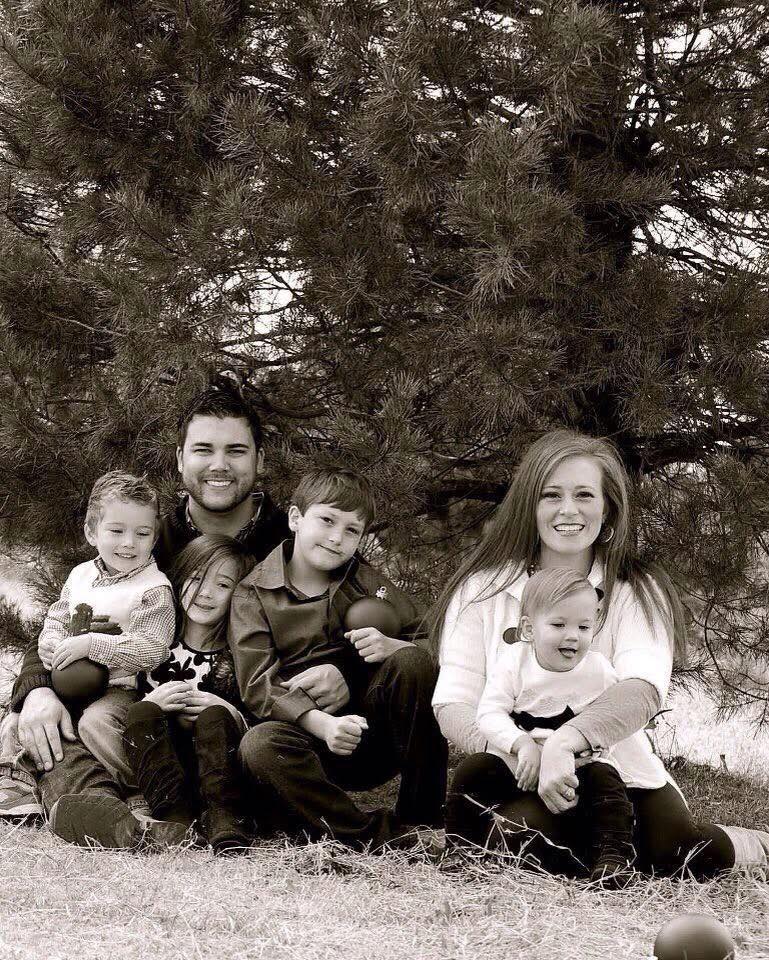
Wasp Sting Revealed Rare Illness – Mom of 4 Couldn't Leave Her Home as It Might Have Been Fatal
When sharp stomach pain first struck, she chalked it up to stress or diet. But nothing explained the dizzy spells, itchy rashes, or sudden waves of exhaustion. It wasn't until a wasp sting nearly killed her that doctors uncovered a hidden battle her body had been fighting all along.
Suki Tipp lived a full, fast-paced life as a mother of four, business owner, and outdoor enthusiast. From whitewater rafting to chaperoning field trips, she rarely slowed down. But in the span of just a few years, her independence vanished. The unpredictable onset of violent allergic reactions forced her into near-total isolation.
Doctors eventually discovered she had a rare blood disorder triggered by the most routine parts of life — cleaning supplies, scented products, even fresh air. Left unmanaged, any of them could have killed her. As her world shrank to the walls of her home, Suki faced the terrifying reality that every outing came with the risk of never coming back.

Suki Tipp posts a throwback picture of her and her daughter, Georgia, posted on May 4, 2025 | Source: Facebook/suki.tipp
A Life of Unexplained Symptoms
In 2015, Suki's body started sending distress signals no one could decode. The first symptom that stood out was intense stomach pain that came and went without warning. At times, the pain was so sharp it left her doubled over, yet multiple colonoscopies showed no abnormalities. Puzzled doctors told her everything looked normal.

A throwback picture of Suki Tipp with her daughter, Georgia, posted on May 4, 2025 | Source: Facebook/suki.tipp
But the discomfort didn't stop at her stomach. Suki developed a rash that seemed to appear out of nowhere — itchy, red, and clustered like ant bites. Headaches became more frequent, her energy dropped, and her mood started shifting unpredictably. Each symptom seemed to exist independently, unconnected, and with no clear cause.
Over the next two years, she visited a rotating cast of medical professionals: two different gastrointestinal specialists, a family practitioner, a neurologist, and an allergist. Yet none of them could piece together what was happening. Her symptoms didn't follow a pattern, and routine bloodwork and scans offered no answers.
In the meantime, Suki pushed through daily life. She was raising four young children and juggling work in real estate, interior design, and project management. Whitewater rafting, field trip chaperoning, and more activities filled her days.
She hiked with her kids, volunteered at school, and was active in her community, ignoring symptoms when she could, managing them when she couldn't. But the longer it went on, the more unmanageable they became.
The Day Everything Changed
In 2017, everything unraveled. Suki was outside when a wasp stung her, one sharp jab she initially thought she could brush off. But within minutes, her body erupted in panic. A searing pain radiated from the sting site, unlike anything she'd ever felt. "It felt like a snake bite," she remembered.
Overheated and dizzy, she staggered into her house and collapsed on the floor vents, hoping the cold air might calm her spiraling symptoms. She managed to text her husband a single plea, "Help me." By the time Chad Tipp reached her, she was in full-blown anaphylactic shock, her eyes rolled back, drenched in sweat, and foaming at the mouth.
Desperate, he drove her straight to Troy Regional Medical Center while calling 911 en route. Suki's condition deteriorated so quickly that she coded three times in the emergency room. She spent the next 10 days in critical care. Once stabilized, she saw an allergist. The doctor suspected her reactions weren't isolated or incidental — they were systemic.
The allergist referred her for a bone marrow biopsy at MD Anderson in Houston, Texas. It was a 500-mile journey, but Suki made it, and her diagnosis was confirmed. And the sting? It wasn't random. It was the catalyst that exposed a hidden battle Suki's body had been fighting all along.
Finally, a Diagnosis: Indolent Systemic Mastocytosis
On March 23, 2018, she finally had an answer from MD Anderson: indolent systemic mastocytosis (ISM). ISM is a rare blood disorder that affects approximately 13 in 100,000 people worldwide.
IIt occurs when the body produces an excessive number of abnormal mast cells, a type of white blood cell that fights allergens and infections. In ISM, however, these cells accumulate in tissues and organs, releasing histamine inappropriately and triggering a chain reaction that mimics a severe allergic response, even without a real threat.
According to Suki's hematologist and oncologist, Dr. Pankit Vachhani of the University of Alabama at Birmingham, "It's a rather rare blood disorder. It is not hereditary. It's caused by a genetic change in the KIT gene. There's no known cause of why this gene mutates in some people — it just happens."
Symptoms vary widely depending on where the abnormal mast cells accumulate. In the gastrointestinal tract, they can cause cramping, nausea, or ulcers. When they infiltrate the bone marrow, they may lead to anemia or excessive bleeding.

Suki Tipp celebrates her daughter, Georgia's 15th birthday with a throwback picture, posted on May 4, 2025 | Source: Facebook/suki.tipp
In many cases, patients suffer from skin flushing, itching, fatigue, bone pain, memory loss, heart palpitations, and episodes of anaphylaxis.
In Suki's case, her condition explained nearly every issue she had faced over the previous two years, though knowing what it was didn't make it any easier to live with. Any exposure to a trigger, known or unknown, could overwhelm her system and send her into life-threatening shock.

A throwback picture of Chad and Suki Tipp with their children, Ramsay, Aurora, Paul Sawyer, and Georgia Tipp, posted on May 4, 2025 | Source: Facebook/suki.tipp
Life on Lockdown: Isolation Becomes Survival
After the wasp sting, her immune system spiraled. Everyday items became hazardous: deodorants, cleaning products, detergent, perfumes, even a piece of fruit. One day, she ate a strawberry with no issue, and the next day, the same snack sent her into shock.
As the triggers multiplied, so did the intensity of her reactions: throat closing, tongue swelling, violent vomiting, diarrhea, migraines, full-body flushing. One morning in September 2018, Suki woke up to find her eyebrows missing.
At first, her children thought it was a prank — her husband, Chad, was known for his humor. But within days, all her hair had fallen out. Dr. Vachhani confirmed that hair loss, while less common, can occur in patients with ISM due to the widespread inflammation in the body.
And yet, this was just the beginning of Suki's new reality. With every passing week, her world shrank. She had once been the mom who cheered from the sidelines, who never missed a recital or an awards ceremony. But now, even stepping outside her home became a gamble.
Her immune system was so reactive that simply sitting at her daughter's football game, high up in the stands, away from the crowd, triggered another anaphylactic episode. Once, she tried dropping off a package at the post office. The freshly mopped floor unleashed chemicals that sent her into another spiral.
Another time, she was in the school pickup line. Thinking she was safe inside her car, she suddenly felt her throat close. A car ahead had someone smoking, and it was enough to trigger her. She flung her door open and collapsed onto the pavement. A crossing guard called 911.
"It's extremely frightening," Suki recalled. "It was happening so often. One year, I used 99 EpiPens." Life outside became impossible. Over the next five years, she rarely left home. Inside, she had control over scents, cleaners, and foods. It became her only sanctuary. "You can keep your home as your fortress, your safe place," she said.
But the emotional cost was crushing. Suki missed out on years of her children's lives — soccer games, dances, birthdays, and graduations. She once lay in bed, so overwhelmed and exhausted, that she began writing goodbye letters to her children for when they would graduate and get married. "I didn't think I was going to be there," she admitted.
Her youngest child was just seven when they learned how to use an EpiPen. "My kids have saved my life more times than I can count," she shared. Her husband, mother, and sisters kept reminding her to hold on. "I was ready to give up," she remembered, but they never let her.

Suki Tipp poses with her daughter, posted on July 2, 2024 | Source: Facebook/suki.tipp
A Ray of Hope: Clinical Trial and Treatment
By 2021, Suki was still alive, but barely living. Every day was a careful negotiation with her surroundings, and hope felt increasingly distant. Then, her doctor mentioned a new possibility: a clinical trial called PIONEER, testing a new drug called AYVAKIT specifically for patients with indolent systemic mastocytosis.

Suki and Chad Tipp with one of their daughters, posted on July 2, 2024 | Source: Facebook/suki.tipp
Suki enrolled in the trial in July 2021. The treatment came in the form of a small daily pill. Unlike antihistamines or EpiPens, which treat symptoms after they have begun, AYVAKIT works by directly targeting the mutated KIT gene, the source of mast cell overproduction.
Within six months, she felt the difference. "She benefited tremendously," said Dr. Vachhani, one of the trial's lead investigators. "Within a few months, she noted dramatic improvements."

Chad and Suki Tipp, posted on July 2, 2024 | Source: Facebook/suki.tipp
By early 2022, her reactions became less frequent and less intense. Her stamina improved. She no longer felt like her body was constantly on edge, waiting to collapse. For the first time in nearly five years, Suki began imagining a life that wasn't centered on crisis management.
In 2023, AYVAKIT was officially approved by the FDA for the treatment of ISM. And for Suki, it marked more than a medical milestone. The trial hadn't just saved her life. It had given it back.

Suki Tipp and her husband, Chad, pose with friends, posted on July 2, 2024 | Source: Facebook/suki.tipp
Life After Isolation
With her symptoms finally under control, Suki began reclaiming her life. Her energy returned. Her fears began to ease. She rejoined her husband Chad in running their engineering firm and resumed the daily rhythms of work and family life with a renewed sense of purpose.
By 2023, Suki had completely reentered the world she once feared. Her children — now teenagers and young adults — watched as their mom slowly reclaimed the moments she had missed. When her daughter graduated from high school, Suki attended the ceremony, hosted the celebration, and went on a cruise to mark the milestone.

Chad and Suki Tipp, dated July 2, 2024 | Source: Facebook/suki.tipp
Today, she and Chad run their enterprise together. Her younger two kids play varsity tennis, and Suki cheers them on — no longer from a distance, but from the front row. "I am trying to take in every single moment," she said. "My husband's like, 'You're doing too much.' I'm like, 'But I missed so much.'"
The last time Suki needed an EpiPen was 18 months ago, an incredible milestone, considering she once used almost 100 in a single year. She still carries precautions as the disorder hasn't disappeared. But for the first time in years, she's not just surviving — she's truly living.

Chad and Suki Tipp pose with their daughter, posted on July 2, 2024 | Source: Facebook/suki.tipp
Spreading Awareness and Living With Purpose
Suki knows her story is rare, but she doesn't believe she's alone. On October 20, 2024, she shared a post for World Mastocytosis Day, opening up about her journey. She thanked the researchers, nurses, and doctors who helped her reclaim her life.
"Not long ago, I was confined to my home—or even the bed, struggling daily with the effects of this disease, and was actively dying," she wrote. "But thanks to the Lord's orchestration and perfect alignment of many factors… I'm now living a life that feels almost normal again."

Suki Tipp poses with her daughter, posted on July 2, 2024 | Source: Facebook/suki.tipp
She also credited her family for literally saving her life during countless anaphylactic emergencies. "Many people don't realize that when someone has a chronic disease or malignancy, it's not just the patient who suffers, but their family too," she emphasized.
Now, Suki wants others who are still undiagnosed and dismissed to feel empowered. "I'm of the opinion that my condition is less rare than we believe," she shared. "You have got to advocate for yourself. And if you know down in your heart that something's not right, you've got to keep pushing forward."
Suki's journey began with pain and confusion, deepened into fear and isolation, and finally emerged into light. Her story is one of resilience, but also a call to action. She's determined to make sure others don't suffer in silence.
The information in this article is not intended or implied to be a substitute for professional medical advice, diagnosis or treatment. All content, including text, and images contained on news.AmoMama.com, or available through news.AmoMama.com is for general information purposes only. news.AmoMama.com does not take responsibility for any action taken as a result of reading this article. Before undertaking any course of treatment please consult with your healthcare provider.
